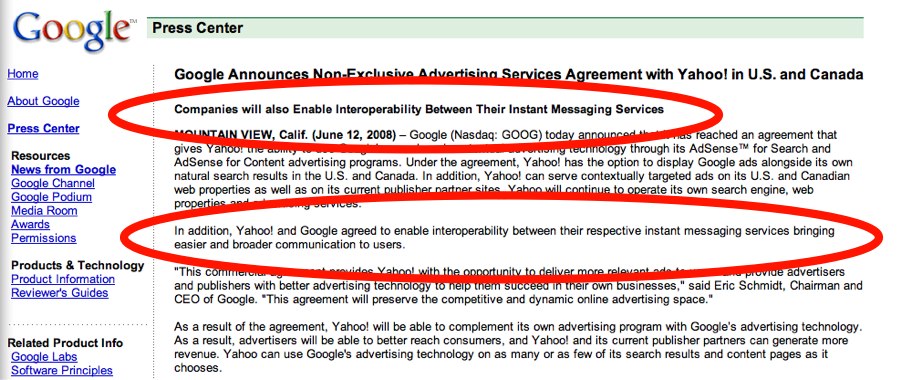Google, Yahoo agreed to IM deal a year ago; Apparently, it quietly died with ad deal

It all started when I was reorganizing my iGoogle pages over the weekend and added a GoogleTalk widget. Some time back, I added AIM messaging into Google Talk so I could chat with the different friends I have on those services in the same window.
So, naturally, I wanted to add Yahoo IM to Google Talk, as well, so I could do all my communications through my iGoogle widget and eliminate the need to have yet another program open all day. I couldn't find an easy way but, not to be deterred, I hammered out a Google query in search of an answer.
Instead, what I came across was a link to a Google Press release dated June 12, 2008 with the headline: Google Announces Non-Exclusive Advertising Services Agreement with Yahoo! in U.S. and Canada. Google, of course, pulled out of that deal when it became apparent that Washington would block it - but I clicked on the link, anyway. That's when I saw the sub-headline on the release: "Companies will also Enable Interoperability Between Their Instant Messaging Services"
OK, so the ad deal died - but what about the interoperability between the two IM services? Since it was Google's press release, I shot off a note to the company to get an answer on what happened and whether the IM services would be interoperable anytime soon. This is the official statement I received in reply:
We strongly support openness and interoperability among IM networks. Ultimately we'd like all IM users to be able to talk to each other, regardless of which network they're on or which client they're using. We've had ongoing discussions with Yahoo!, but we don't have anything specific to announce.
Hmmm. It seems to me that the companies could do this if they really wanted to - after all, they were far enough along from a technology perspective to announce it a year ago. Instead, the politics of business seem to have gotten in the way - and, once again, it's the users who pay the price.
